
adls.org.nz NEWS Oct 28, 2022 Issue 38 Inside ■ TRUSTS The minority in D v A P06 ■ EMPLOYMENT A big win for Uber drivers P09 Tight consultation deadlines for not-for-profits’ REGIME
LawNews is an official publication of Auckland District Law Society Inc. (ADLS).
Editor: Jenni McManus Publisher: ADLS
Editorial and contributor enquiries to: Jenni McManus 021 971 598

Jenni.Mcmanus@adls.org.nz
Reweti Kohere 022 882 2499
Reweti.Kohere@adls.org.nz
Advertising enquiries to: Darrell Denney 021 936 858
Darrell.Denney@adls.org.nz
All mail to: ADLS, Level 4, Chancery Chambers, 2 Chancery Street, Auckland 1010 PO Box 58, Shortland Street DX CP24001, Auckland 1140, adls.org.nz
LawNews is published weekly (with
exception of a small period over the Christmas
and is available free of charge to members of ADLS, and available by subscription to non-members for $140 (plus GST) per year. To subscribe, please email reception@adls.org.nz.
of
stated,
or its members.
views and
lies
correctness of
02 Contents
the
holiday break)
©COPYRIGHT and DISCLAIMER Material from this publication must not be reproduced in whole or part without permission. The views and opinions expressed in this publication are those of the authors and, unless
may not reflect the opinions or views
ADLS
Responsibility for such
for the
the information within their articles
with the authors. Poorly resourced and operated by volunteers: why some incorporated societies will struggle with the new Act DUTIES COMPLIANCE REGULATIONS 03-05 Opinion: Getting ESG issues onto directors’ radar SOCIAL ENVIRONMENTAL DUTIES 08-09 Chapman Tripp’s Arthur Young calls it quits after 65 years in the law VETERAN CLIENTS PARTNER 07, 14-15 EVENTS 14-15 Cover: Henrik Sorensen / Getty Images Write for LawNews LawNews welcomes commentary and opinion pieces from ADLS members and readers. We ask that contributions are civil in tone, factually correct, well-written and logically argued – and fewer than 800 words. And we won’t publish anonymous commentary. Any questions, please email the editor at: Jenni.McManus@adls.org.nz Photo: Tetra Images / Getty Images FEATURED CPD 10-11 CPD IN BRIEF 12
Lawyers, clients warned of tight deadlines and ‘significant knowledge gap’ around new incorporated societies regime
Most incorporated societies are poorly resourced, struggle to attract competent leaders and are operated by volunteers who join because they are eager to contribute to the society’s altruistic purpose rather than its dayto-day affairs
Reweti Kohere
From local rugby clubs and pest eradication groups to unions and the New Zealand Automobile Association, tens of thousands of incorporated societies will grapple with impending and significant changes to how their membership-based organisations function in the 21st century.
Yet the truncated consultation period for the proposed regulations to sit alongside the Incorporated Societies Act 2022 is exposing a lack of awareness by societies and lawyers of what lies ahead. And that could leave societies on the back foot as the new regime is embedded.
Other issues identified by those working with the new legislation include a lack of understanding about the new statutory duties and level of risk for officers of incorporated societies and the amount of time and upskilling needed to comply with the new legislation.
Because few lawyers are specialists in this area, there are also fears that many societies will struggle to be compliant by April 2026 when the new legislation comes into force.
Others spoken to by LawNews point to the tight consultation period on the regulations, saying many of these organisations are at the same time trying to prepare submissions on the Charities Amendment Bill.
The background
At least 24,000 incorporated societies exist in Aotearoa
New Zealand, representing a rich tapestry of community activities. Most operate in the non-profit sector, making a direct impact on New Zealand’s social and economic development by pursuing cultural, recreational, social and philanthropic purposes.
For the past 114 years, these organisations have been governed by the Incorporated Societies Act 1908. But as societies have multiplied in number and as New Zealand has evolved, the 100-plus-old statute’s deficiencies have become apparent.

It gives little practical guidance on how members handle operational matters, how internal disputes are resolved and what obligations society officers must observe. The Act has shown its age.
Kicked off by a Law Commission review in 2010, reforms lingered on successive legislative programs for more than a decade until Parliament in April this year passed the Incorporated Societies Act 2022.
Governance
The new statute aims to promote high-quality governance and lawmakers have looked to company law for guidance. The sorts of duties required of directors under the Companies Act 1993 – to act in good faith and to exercise care and diligence, for instance – have been prescribed to
03 Oct 28, 2022 Issue 38
INCORPORATED SOCIETIES
Continued on page 04 Photo: sesame / Getty Images
society officers.
However, this has collected some strong criticism. In a submission on the Incorporated Societies Bill, Chapman Tripp partner Roger Wallis argued societies and their officers shouldn’t be burdened with such onerous duties, especially given their not-for-profit mandates and scant resources and skill. Nonetheless, Parliament codified the responsibilities.
The 1908 Act remains effective until reregistration opens in October 2023. Societies will cease to exist if they don’t amend their constitutions by April 2026.
In the next year, the Ministry of Business, Innovation and Employment (MBIE) will formulate new regulations to flesh out the 2022 Act on issues ranging from fees for compliance failures to the kinds of information that annual reports must contain. Consultation opened on October 11 and closes November 22.
Submitters have only four weeks to respond, but the shortened timeframe exacerbates a more fundamental issue, says Craig Fisher, a consultant at specialist audit and assurance firm RSM and an ADLS council member.

A lot of incorporated societies aren’t as aware of the changes and the implications as they should be so they might not know enough to submit, he says. In turn, MBIE might not get much feedback. “And then, what will typically happen is the New Zealand disease of ‘hang on, we’ve got regulations and now they apply. I don’t like this, I wouldn’t have agreed with this had I known. How could they do this to us?’”
Most societies are poorly resourced, struggle to attract competent leaders and are operated by volunteers who join because they are eager to contribute to the society’s altruistic purpose rather than its day-to-day affairs.
Fisher says even achieving quorum for annual general meetings is a yearly challenge. “It’s kind of like the frog in the hot water. The water is getting hotter and life seems to be getting harder, but the frog doesn’t jump out. Eventually the frog in the hot water boils.”
That organisations are good at complaining, but reluctant to do anything to improve their situations is a conundrum, says Fisher, who links it to a broader apathy infecting civil society. Voter turnout at the most recent local elections was a smidge over 40%. “It’s easier to complain sometimes than it is to engage.”
Consultation influx
The regulations consultation isn’t the only document confronting the for-purpose sector. According to charities lawyer Sue Barker, one mental health and addiction charity she knows is juggling at least another four feedback processes –and all are due in November.
In addition to providing feedback on the incorporated societies regulations, the organisation’s consultation todo list includes submitting on the government’s Charities Amendment Bill 2022.
One-third of societies are registered charities too, Barker says, and the proposed amendment to the Charities Act 2005 is a crucial opportunity to take stock. “Charities, by definition, exist into perpetuity and it’s not often these issues come up for parliamentary time. It’s been 20 years since the Charities Act was enacted. This is the first time we’ve had a proper look at it.”
The Social Services and Community Committee has extended the submission deadline to December 9, although Barker notes the extra month eats into the committee’s own time to report back to Parliament on the Charities Amendment Bill.
Lawmakers seem focused on completing the process before the 2023 general election, rather than getting the legislation right. Barker thinks that’s a mistake, saying the Bill deserves better attention and time than has been provided.
The influx of consultation, across multiple sectors and in such a short space of time, is Barker’s biggest concern as it compromises incorporated societies’ ability to give the meaningful feedback they otherwise could provide.
“Democracy is the kaupapa of the not-for-profit sector,” she says. “I wouldn’t want them not to consult but what worries me is they are doing it all at the same time.”
Health check
Incorporated societies are comprised of members and run by them for their benefit. But like any democratic body, they are prone to division, says Parry Field Lawyers partner Steven Moe. “Nobody is going to argue that democracy is a bad idea. But inherent in democracy is that everyone has a voice and therefore voices can take over an entity like an incorporated society.”

Reregistration will last two-and-a-half years, so there’s enough time for societies to get familiar with the changes, Moe says. But a more existential question confronts them: whether incorporation remains the best legal structure for their purposes. “This is a chance to refresh everything. This is a totally unique event where all 24,000 of them have to look in the mirror.”
Moe is fielding inquiries from a dozen societies and some are contemplating how best to enshrine their purpose across future generations, for fear their organisations could be taken in altogether different directions under newly elected committees.
Others are wondering what alternatives are available as they aren’t legally big enough to remain incorporated, having fewer members than the current minimum eligibility requirement of 15 (under the new Act, at least 10 members are needed for incorporation).
For those societies, big picture considerations have already landed in their in-tray. “Every organisation should be asking this more frequently than they do: ‘Are we in the best legal vehicle to achieve our mission and purpose?’,” Moe says. “That’s just a health check every legal entity should go through.”
04
Continued on page 05 Continued from page 03
Craig Fisher
Steven Moe
Lawmakers seem focused on completing the process before the 2023 general election, rather than getting the legislation right
Upskilled lawyers?
There may be 14,000 or so lawyers practising in New Zealand, but very few specialise in incorporated societies. Over the 25 years that Hastings barrister Mark von Dadelszen has been talking to lawyers about this area of law, he says he can count on one hand the number who learned about societies at university. Even then, their encounters with incorporated societies were brief.
“It’s a bit like saying ‘what do you know about patents?’,” von Dadelszen says. “Ninety-nine per cent of lawyers would say ‘very little’. It’s only those who’ve had some reason to specialise in that area of law who would know anything about patents.”
Von Dadelszen isn’t too concerned about the nature and content of “perfectly reasonable” six-week consultation period and the regulations themselves didn’t surprise him.
His most pressing worry is that the legal profession will face “a truckload of work” as societies seek advice on the effects of the changes. And yet those instructions will most likely be the first time lawyers encounter the 2022 Act.
Conveyancers and commercial lawyers are best placed to meet the impending workload and von Dadelszen urges them and the wider profession to ready themselves. “It’s going to be
challenging for lawyers to upskill themselves in time to do that work properly and competently.”
Most society members will expect lawyers to know about the Act and its implications. But that’s unrealistic, says von Dadelszen, who worries that lawyers who haven’t kept abreast of the changes will be caught short. He understands the predicament. “I’ve been there, I’ve done that, I know what it’s like to have new laws thrust upon you, which you have to comply with,” he says.
But the gap between client expectations and lawyers’ knowledge can be huge, and practitioners shouldn’t underestimate the “considerable” amount of time and energy it’ll take to come up to speed.

Once they’ve prepared, though, lawyers should proactively contact their society clients to kickstart reregistration “sooner rather than later”.
Most of the upcoming legal work will focus on amending societies’ constitutions to ensure they comply with the new requirements. Getting them right will set societies up for the future, says Barker.
Until then, they have just four weeks to submit on MBIE’s proposed regulations. Fisher says the time to act is now, “to understand what’s being proposed because if it’s going to be modified, this is the time to modify it, not once the regulations are in place”. Link to On Demand seminar here ■
Interested? Are you...
• Passionate about promoting a thriving legal community in New Zealand?
• Interested in managing a portfolio of specialist legal committees?

• Want to join a team making a real difference to the law and the legal profession?
Independent workplace investigations
Baker Tilly Staples Rodway are experienced at carrying out workplace investigations. As licensed Private Investigators under the Private Security Personnel Licensing Authority and experienced Human Resources practitioners, our team can assist you in conducting an independent workplace investigation.
We bring the “best of both worlds” to our investigations by covering the legal bases while demonstrating an in-depth understanding of diverse work environments.
Contact Chris Wright on +64 9 373 1101 chris.wright@bakertillysr.nz
05 Oct 28, 2022 Issue 38 To view the PD click here
We' re looking for a lawyer who is looking for a change.
Continued from page 04
This is a totally unique event where all 24,000 of them have to look in the mirror
Parental fiduciary duty: the minority decision in D v A
Anthony Grant
My last article was on the Court of Appeal’s decision in D v A [2022] NZCA 430. Can a child sue a parent for a breach of fiduciary duty?
The court held, by a majority of two to one, that a father who had repeatedly raped his daughter and destroyed her life was not acting in breach of fiduciary duty when, 30 years after she left home, he disposed of all his assets so she couldn’t sue his estate after he died.

Collins J dissented. He described the state of the daughter more than 30 years after she left home with these words:
“[she] has struggled to find accommodation… occasionally, she has been forced to live in her car. She has had no fixed abode or permanent work … [she] said she continues to live in poverty and that she suffers from poor health associated with posttraumatic stress disorder.” [22]
Kós P and Gilbert J held that the father’s fiduciary duties to the child ceased when she became an adult.
Several readers have contacted me about the case to say they disagree with the majority’s decision. Because the decision has a number of novel aspects, I am writing a little more about it.
My first observation is that it appears to be agreed that a parent owes fiduciary duties to a child under the age of 20.
Kós P described the nature of the fiduciary duty as being “to refrain from acts that fundamentally violate the relationship of trust inherent in a parent-child relationship. Foremost within a duty expressed in such terms is to refrain from sexually and physically abusing the child”.
It appears that if the daughter, having left home, had sued the father within the time allowed under the Limitation Act, she would have had a good cause of action. Her claim would have been for exemplary
damages arising from physical and/ or mental injuries she suffered, since such claims are not prevented by the accident compensation regime: see the Supreme Court’s decision in Couch v Attorney-General (No 2) [2010] 3 NZLR 149.
Although the three children in D v A failed in their claims, they have trailblazed a path for future victims of parental violence to find a way to sue the offending parent.
Collins J held that the father’s fiduciary duty to the daughter “continue[d] after the child became an adult.” He gave the example of a “severely disabled child who is dependent on their parents for care and support…” [79] and held by the same form of reasoning that the father in D v A owed a continuing duty to the daughter during the 30 years that passed after she left home and when he gave away his assets to defeat any claim she might make against his estate.
He held that the father owed fiduciary duties to the daughter “throughout her adult life” [102]. By contrast, Kós P and Gilbert J held that the father’s fiduciary duty “ceased when he no longer lived with, or cared for, the children”. [152]
Although Gilbert J said the harm the father had caused the daughter was “incalculable” and “ongoing” [121], he said her claim was statute-barred by the time the father gifted his assets to a trust [138]. In saying this he added that “no such fiduciary relationship or fiduciary duty has been recognised in Australia or in England” [136].
The daughter’s decision not to communicate with her father for 30 years was said to be a barrier that stood against her.
But when a father has caused his child “incalculable and ongoing harm”, it is understandable that she will not want to communicate with him and it seems harsh
to criticise her for avoiding contact.
The Court of Appeal’s decision is notable for the strength of the division between Collins J and Gilbert J. Amongst other things, Gilbert J described Collins J’s decision as “unprincipled”. [122]
A decision that has no precedent can be described as “unprincipled” but when that decision is caused by the “incalculable and ongoing harm” that Gilbert J says a parent has inflicted on his child and which has destroyed her life, many will say it’s time for the law to change.
La Forest J of the Canadian Supreme Court has said, “it is intuitively apparent that … the sexual assault of one’s child is a grievous breach of the [fiduciary] obligations arising from that relationship …. The act of incest is a heinous violation of that obligation”.
The consequences of such actions should not be curtailed by the Limitation Act since many victims of such attacks will be traumatised, poor and have no resources or skills to engage in litigation. The law should construct a way for a cause of action to be perpetuated to provide meaningful recourse for the victims of such acts. Collins J has showed what one such path might be.
Not only would such a cause of action provide a form of redress for terrible actions but it might also, in a small way, act as a deterrent to some parents who think they can get away with such actions with impunity.
The fact that neither England nor Australia has recognised such a claim is not a good reason for New Zealand not to do so. Our judges should have the confidence to make new law where the principles of justice require it. ■
Anthony Grant is an Auckland barrister specialising in trusts and estates ■
06
TRUST LAW
Although the three children in D v A failed in their claims, they have trailblazed a path for future victims of parental violence to find a way to sue the offending parent
Anthony Grant
Arthur Young’s
Friends, family, colleagues and members of the judiciary gathered at the Northern Club in Auckland on Thursday 20 October for a dinner, hosted by ADLS, to celebrate the career and retirement of veteran lawyer Arthur Young.
Young, aged 87, had been a partner at Chapman Tripp for most of his career, his wife (and former Chapman Tripp partner) Helen Melrose said, ever since Sheffield Young, the firm he joined as a rookie lawyer 65 years ago, merged with Chapman Tripp. He specialised in private client work, including family trusts and succession planning, and some clients have been with him for more than 40 years.
But he won’t be giving up work altogether and still has a handful of clients on his books. When asked about his favourite type of client in an interview with LawNews earlier this year, Young said he’d always gravitated towards people rather than corporate balance sheet.

dinner: 65 years in the law
In introducing him at last Thursday’s dinner, ADLS President Marie Dyhrberg KC revealed that her first job after graduating from law school was with his firm, Sheffield Young & Ellis.
Melrose told guests her husband had “many fabulous qualities”, including a commitment to serving clients, his firm and the community; fairness; courage and innovation.
Corporate clients appreciated these qualities, she said, especially when finding themselves in a tight spot. Young had a “deeply thoughtful” approach, was far-sighted and could be relied upon to find solutions to complex problems. But alongside these corporate clients, he also provided excellent service to families with fewer resources.
“The thing about Arthur is that fundamentally he loves the law, he loves the ordering of society that laws provide and the logic of law. He loves that it can be applied to bring fair and just outcomes,” Melrose said.
“Arthur is an energetic and positive force. His legal and business advice is always provided with a good shot of realism and clarity. He is a terrific human being and a terrific lawyer.”

Young spoke of the foresight of his colleague Joe Sheffield who in the 1950s dreamed of branching out into commercial law at a time when a major commercial transaction was the sale of a corner dairy or a residential land deal. This became embedded in Young’s DNA as the firm expanded, strengthened and merged.
Young said he particularly loved the grey areas of the law – what he calls “real law”. “Some of the black letter stuff is actually quite easy. It’s at the interface where judgment calls have to be made.” ■
Jenni McManus ■
For a selection of photos, please see pages 14 and 15
07 Oct 28, 2022 Issue 38
ADLS EVENT
retirement
ADLS Annual Breakfast with the Attorney-General Hon David Parker WHEN Friday, 2 December 2022, 7:15 8:30AM WHERE Rydges Hotel, 59 Federal Street, Auckland CBD DRESS CODE Business attire FOR MORE INFORMATION AND TO REGISTER, PLEASE CLICK HERE OR EMAIL EVENTS@ADLS.ORG.NZ
Steven Moe

Changes are now before Parliament which, if passed into law, will see an amendment to s 131 of the Companies Act.
That section is the foundation of the other duties as it contains the well-known phrase that directors: “…must act in good faith and in what the director believes to be the best interests of the company”.
The proposed changes (set out at the end of this article) are positive and will make clearer the matters directors should consider when deciding how to act in the best interests of the company. However, some argue that change is not needed, as laid out in this recent ADLS article
I’d like to tease out that line of argument – that directors already take into account the ESG factors laid out in the bill currently before Parliament.
There is an intersection near where I live which did not have a stop sign. It was notorious for crashes. Why? Drivers new to Canterbury’s rural roads are unaware that they need to slow down, stop, consider the situation and then move forward. And sometimes we need reminders of what a local might think is obvious. A simple solution was to add signs and even some flashing lights at the intersection to alert people that they needed to slow down and think.
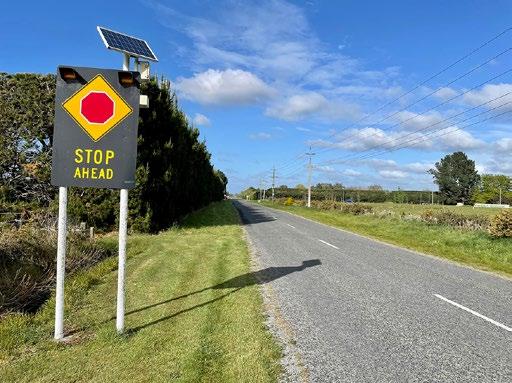
It’s the same with s 131. What we are talking about is some “signage” that makes it clear that before making decisions directors should slow down, consider many perspectives and only then move forward. The signs are not for the “locals” (lawyers who have studied and specialise in what director duties are) but instead for directors who are not familiar with their statutory duties or what they need to consider.
Amending s 131 and upgrading our understanding of directors’ duties will be a helpful tool to start more conversations
In defence of the proposed changes to directors’ duties
and raise awareness of factors to take into account. We need paradigm-shifting thinking to deal with the major issues being faced in our society, not just more of the same approach that got us here. The proposed amendment is a small step in the right direction but just the first of many that will be needed.
We have to wake up to the severity of issues such as climate change and start pulling on all the levers we have if directors are to consider relevant factors when making decisions.
On the agenda?
Arguing that directors are already doing this will not be viewed kindly by history. Change is needed. Some factors in the new bill include the principles of the treaty and the environment and I don’t believe these are yet points which most boards are really wrapping their heads around. As an example, it is only from 2023 that our largest companies (a very limited number) will be forced to consider climate-related impacts in changes the XRB is about to release
I can understand how such perspectives could have been shaped for lawyers and commentators who consistently deal with NZX-listed or very large companies. These entities have the budget to engage consultants and lawyers and consider things more. Of all the entities in our market, they are the most likely to already take into account wider stakeholders and the impact of their decisions on consumer choices relating to their brands.
But here is the reality: boards could consider these points, but they don’t – at least, not yet. They need some signs.
‘Genuine surprise’
According to Companies Office records, on 30 September 2022
08
OPINION
We need paradigm-shifting thinking to deal with the major issues being faced in our society, not just more of the same approach that got us here
The proposed amendment is a small step in the right direction but just the first of many that will be needed
Continued on page 13
Steven Moe
Briefs
Uber drivers win employee status
Rideshare company Uber is likely to appeal this week’s ruling from the Employment Court where Chief Judge Christina Inglis declared four of its drivers to be employees of the business, rather than independent contractors.
E Tu Inc & Ors v Rasier Operations BV & Ors [2022] NZEmpC
192 is among several similar cases that have been taken in other jurisdiction, Chief Judge Inglis noted in her decision, and the results have been mixed. She also commented on the growing fragmentation, casualisation and globalisation of New Zealand’s workforce.
The key issue, to be decided was to what extent the definition of “employee” in s 6 of the Employment Relations Act 2000 captured these new ways of working. So, within the context of a rapidly evolving labour market, are the plaintiffs within the range of workers the legislation was intended to protect?
Chief Judge Inglis said the Supreme Court’s binding ruling in Bryson meant she was required to consider all relevant matters when determining the nature of the relationship, not just the intention of the parties, as specified by Parliament.
In the Uber case, this meant looking at the nature of the business and the way it operates; the impact of the business model and operations on the drivers; who benefits from the drivers’ work; who exercises control over the drivers’ work, the way it is conducted and when it is conducted; any indication of intention from Uber’s terms and conditions and other documentation between the parties; and the extent to which the four drivers identified as part of the Uber business.
Uber argued that through its app it was merely an intermediary and its Rideshare and Eats businesses simply facilitated a contractual relationship between the drivers and riders/eaters.
But Chief Judge Inglis said while the drivers were not required to front up to a physical workplace at a specific time, which might suggest they were not employees, other factors were more significant.
It was clear Uber dictated the contractual terms for drivers, who had to agree to its terms and conditions before they could use the app. Uber, and not the drivers, determined the cost of each trip. They were also subject to Uber’s direction and control in more subtle ways through its ratings system, incentive scheme, prompts, warnings and disciplinary system. The drivers had little or no ability to improve their economic position through their professional or entrepreneurial skills, Chief Judge Inglis said.
“Stripped back to its fundamentals, Uber is the only party running the business.” ■

Assistant Public Defender
Te āhuatunga a te tūranga - About the role
South Auckland has one of the most diverse communities in New Zealand and our Manukau office has an important role in helping some of the most marginalised people in that community. To help lead our office in that work, we are looking to appoint a second Assistant Public Defender. Reporting to the Manukau Public Defender, we are looking for an experienced senior criminal lawyer with effective people leadership skills, and who is a motivational and inspiring leader.
You will be a member of the Senior Leadership team. While maintaining your own case load, you will also be responsible for leading and managing a number of Legal Team Managers. You will ensure the smooth operation of the office, and that staff have the knowledge, skills, resources, systems, and processes required to deliver high quality services. To achieve this, you will have a key coordination role across the office.
Mō te tīma - About our team
The PDS provides high quality legal advice and representation in a full range of criminal cases. Aimed at helping people access justice, the PDS promotes the values of respect, integrity, service and the delivery of excellent service to its clients.
Our Manukau office is the largest of the PDS offices - with around 60 legal and support staff. It is a busy and sometimes demanding environment with variety and challenge in one of the fastest growing communities in the country.

Tono mai - How to apply
Please apply via our careers website using job reference number MOJ/1670564.
If you would like a confidential discussion before making an application, please contact Mark Williams, Manukau Public Defender via email; Mark.williams@PDS.govt.nz
Applications close on Monday, 7 November 2022.
09 Oct 28, 2022 Issue 38
apply.justice.govt.nz
ALL-LEVELS
WEBINAR
Purchase price allocation rules
Webinar 1 CPD hour
Tuesday 1 November 12pm – 1pm
Price from $80 +GST
Presenters Helen Johnson, partner, PwC Legal; Iain McConville, technical specialist, Customer Compliance Services – Business, Inland Revenue and Nico Murray, customer compliance specialist, Customer Compliance Services –Business, Inland Revenue
These rules have tax implications for vendors and purchasers in property and business transactions and in situations where it may not be obvious that a purchase price allocation is required. Legal advisors need to fully understand these rules and be able to advise clients when deals are being negotiated and agreements are being signed.

Avoiding pitfalls with business sales

INTERMEDIATE COMMERCIAL SEMINAR
Workplace mental health

ALL-LEVELS
Livestream
1.5 CPD hrs
Person
Monday 14 November 4pm – 5.30pm
Price $110 +GST
Presenters John Rooney; Myriam Mitchell and
John Fitzgerald
In Person | Livestream
2 CPD hrs
Tuesday 8 November 4pm – 6.15pm
Price from $140 +GST
Presenters Shane Hussey, director and principal, Hussey & Co and Sian Heppleston, analyst, Hussey & Co
Whether it is the sale of a business, the transfer of a business as part of a relationship property settlement or the execution of an estate, there are pitfalls when advising on transactions which lead to the sale of all, or part of, an interest in a business and which impact on the value of a business. Learn how to avoid these issues.
PERSON
LIVESTREAM
With the spotlight on mental wellbeing at work, employers must understand their obligations under the Health and Safety at Work Act 2015 (HSWA). This seminar will offer insights and practical guidance on how best to advise clients.
Chair Tim Clarke, partner, Bell Gully
10 FEATURED CPD
TAX
EMPLOYMENT SEMINAR
| In
Dr
FINAL NOTICE FIND OUT MORE
IN
FIND OUT MORE
adls.org.nz/cpd cpd@adls.org.nz 09 303 5278
Partnership law
JUNIOR COMMERCIAL WEBINAR
Webinar 1 CPD hr

Tuesday 15 November 12pm – 1pm
Price from $80 +GST
Presenters Gerard Dale, partner, Dentons Kensington Swan and Sarah Gibbs, senior associate, Dentons Kensington Swan
Is the partnership structure still relevant in the 21st century? What is a partnership and how do you know if you’re in one? How do you establish a partnership and what are the common issues and pain points?

OUT
Personal effectiveness workshop
ALL-LEVELS IMPROVEMENT WORKSHOP
Online workshop 4 CPD hrs Thursday 17 November 9am – 1.15pm
Price from $400 +GST Facilitator Tony Gardner, managing director, Archetype Leadership + Teams
Back by popular demand, this workshop offers a range of personal effectiveness insights and tools to help increase your productivity and return-on-effort at work. It is facilitated by a leading high-performance consultant. Limited spaces available
Advanced parole law

ADVANCED PAROLE SEMINAR
Livestream | In Person
1.5 CPD hours
Monday 21 November 4.30pm – 6pm
Price from $100 +GST
Presenters Emma Priest, barrister, Blackstone Chambers and Hannah Kim, barrister
Parole law is a growth area, as more prisoners are wanting legal representation when seeking parole. Broaden your skills with this practical session on advanced parole law and complex applications.
Chair Sir Ron Young, chairperson NZ Parole Board
11 Oct 28, 2022 Issue 38
FIND
MORE FIND OUT MORE LIVESTREAMIN PERSON
Managing IP disputes
Livestream
Tuesday
4pm –
Presenters Jane Glover, barrister, Sangro Chambers and Kevin Glover, barrister, Shortland Chambers
Making restorative justice work

Livestream
2
Tuesday
4pm – 6.15pm
Price from $140 +GST
Decisions made at the outset of an intellectual property dispute can have a strong bearing on how the case is ultimately resolved. This seminar will outline typical scenarios and how you can be an effective first port of call for your prospective plaintiff or defendant client.

IN PERSON
Don’t approach restorative justice as just another box you need to tick to proceed through the criminal justice system. Benefit from practical insights into how you can make the most of the restorative justice process and how it can serve the needs of all parties.
Chair Judge Phil Recordon
A guide to
Presenters Samira Taghavi; Helen Bowen; Colin Rose; Jean Staples and Jon Everest Webinar
CPD
Thursday
1pm – 2.30pm
Presenter Hamish McQueen, senior associate, Gilbert Walker
IN PERSON
Valuable insights for litigators on this useful remedy, including why you might seek a declaratory judgment, the legal tests and practical guidance on procedure.


OUT
Developments
Online
Tuesday
4pm – 6.15pm
Presenters Graham Kohler KC, Kate Davenport KC and Yvonne Mortimer-Wang, barrister, Shortland Chambers
Chair Paul David KC
An update on what’s happening in New Zealand and elsewhere with contract interpretation, implied terms and damages.
PERSON

12 CPD IN BRIEF
declaratory judgments
in contract interpretation
| In Person
CPD hrs
29 November
1.5
hrs
1 December
| In Person 2 CPD hrs
6 December
| In Person 1.5 CPD hrs
22 November
5.30pm
Evidence Law Update Thursday 8 December | Livestream | 2 CPD hours Visit adls.org.nz for more information. LIVESTREAM FIND
MORE LIVESTREAM
LIVESTREAM
IN
there were 710,364 registered companies. Think about the vast majority of SMEs (those with fewer than 20 employees) which, according to Stats NZ, represents 97% of all New Zealand enterprises.
Just last week I was facilitating a session for 25 directors and they were all genuinely surprised at this proposed change and the possibilities it opens up for conversations around the boardroom table.
I’m willing to bet that the factors laid out in the bill are not on the agenda for many of those hundreds of thousands of boards – but they should be.
It is for these smaller companies that putting up some clear signage will have the most direct and immediate impact – a sign that will cause them to slow down and consider all angles to an issue when making a decision.
But is it going too far? And will it lead to great confusion for judges to interpret? I doubt it. The change requires only that directors “may” consider a list of factors. Unlike a similar provision in the UK, there is no “must”. The sky has not fallen over there, despite the equivalent section being included since 2006.
What is proposed here is not world-leading. If anything, it is a minor catch-up and I talked about that with the instigator of the bill, Dr Duncan Webb, here on seeds podcast. Perhaps this might be recognised as a starting point, heralding a new way of thinking about stakeholder governance.
At some point we may even be ready to engage further with suggestions in this report a few of us wrote on Structuring for Impact: Evolving Legal Structures for Business in New Zealand
We live in a world where we need to reimagine the role of business. We need to consider questions of moral imagination as
Offices Available
Following some barristers retiring, we have three offices of varying sizes available for rent.
The Chambers share a refurbished floor (with separate areas) with Hussey & Co., a boutique forensic and general accounting firm. There are shared meeting rooms (a formal boardroom with video conferencing facilities and a less formal meeting room), and communal entrance and client waiting area.
Telephones, internet connection, printing and secretarial services also available and some furniture available.
Cost depends on office size and range from $150 – $300 per week plus gst. No long-term commitment required.
Photographs of the Chambers can be viewed at www.hco.co.nz/gallery.
Contact: Shane Hussey for further details, Shane@hco.co.nz
well, like “when is enough, enough?” How can we empower and incentivise founders to pursue both profit and purpose? And if a company consistently profits from producing single-use plastic items to sell sugared-up water to children that impacts their health negatively, then are we okay with that?
The law needs to constantly be evolving to help provide guidance – signposts along the road – that will help our directors to navigate through issues safely.
Like the Canterbury intersection with so many crashes, the proposal will help directors as they exercise their duties and provide clearer instruction on what they should be considering.
This will be a helpful shift towards a future where this argument is no longer relevant, where boards automatically consider all these and other issues.
Such a day has not yet come.
The proposed changes to be added to s 131 of the Companies Act 1993:
“To avoid doubt, a director of a company may, when determining the best interests of the company, take into account recognised environmental, social and governance factors, such as:
■ recognising the principles of the Treaty of Waitangi (Te Tiriti o Waitangi):
■ reducing adverse environmental impacts;
■ upholding high standards of ethical behaviour;
■ following fair and equitable employment practices; and ■ recognising the interests of the wider community.” ■ Steven Moe is a partner at Parry Field Lawyers ■
Litigation and Dispute support – taxation
Are you requiring professional and technical support for client litigation or disputes involving tax matters?
We can help.
Contact Anne Edgar at: anne.edgar@shellockconsulting.co.nz or 021 037 8150
Independent, efficient, experienced and confidential www.shellockconsulting.co.nz

13 Oct 28, 2022 Issue 38
09 300 5481
Continued from page 08
I’m willing to bet that the factors laid out in the bill are not on the agenda for many of those hundreds of thousands of boards – but they should be
The law needs to constantly be evolving to help provide guidance – signposts along the road – that will help our directors to navigate through issues safely
Retirement dinner for Arthur Young
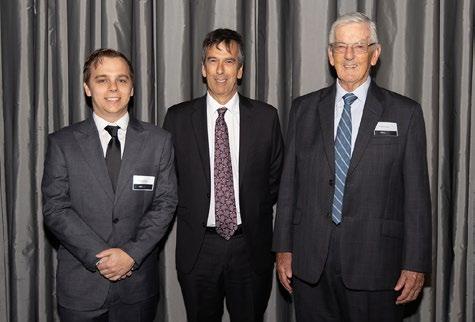
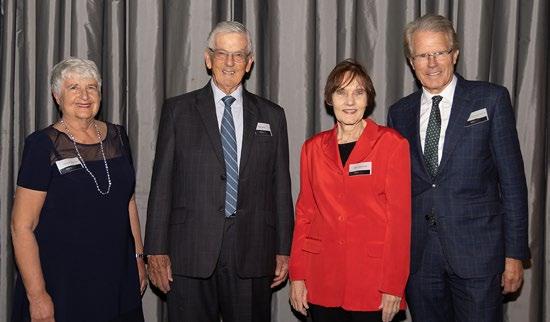
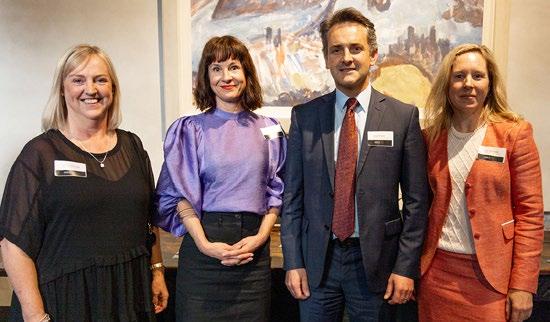
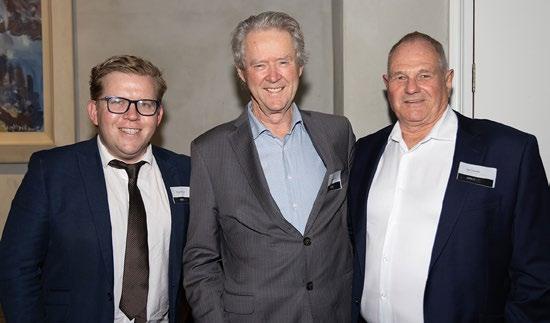
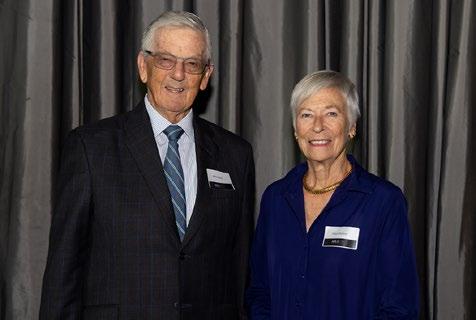
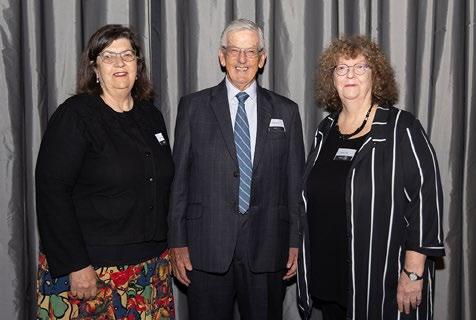
14 Events
Adrienne Young-Cooper, Arthur Young and Audrey Young
Arthur Young and Helen Melrose
Timothy Orr, Brian Keene KC and Ian Lowish
Lyndsay Partridge, Phillippa Wilkie, Jarrod Walker and Kelly McFadzien
Dame Sian Elias, Arthur Young, Marie Dyhrberg KC and Raynor Asher KC
The Northern Club Auckland, 20 October 2022.
George Young, Michael Young and Arthur Young
8.30am Rydges Auckland,
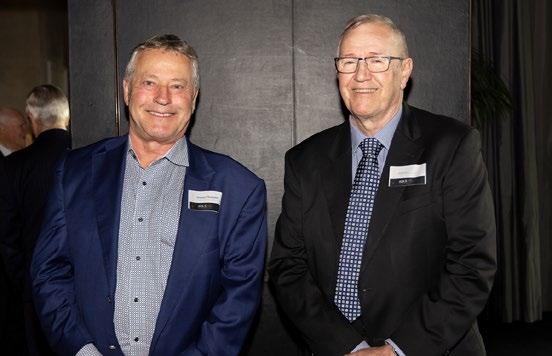
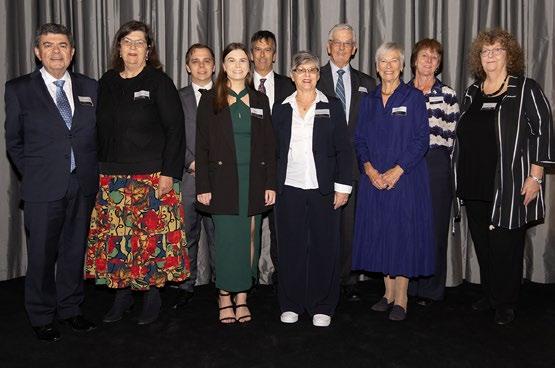


Federal

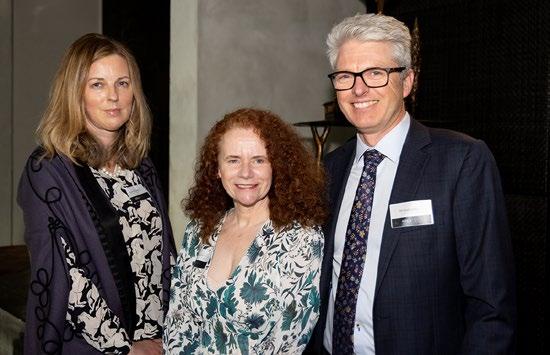
15 Oct 28, 2022 Issue 38 Hamilton sundowner Wednesday 23 November 5.30pm – 7.30pm The Verandah Cafe & Function Centre, Rotoroa Drive, Hamilton Lake Annual breakfast with the Attorney-General Friday 2 December 7.15am –
59
Street, Auckland CBD Featured events Connecting New Zealand lawyers events@adls.org.nz adls.org.nz December Wednesday 7 | Northland lawyers’ lunch Thursday 8 | East Auckland lawyers’ lunch Upcoming
Justice Mark Cooper, Adrienne Young-Cooper, George Young, Emily Young, Michael Young, Sonja Hildesheim-Young, Arthur Young, Helen Melrose, Diana Young and Audrey Young
Victoria Heine KC, Alexandra Low and Michael Arthur
Gregory Thompson and Jonathan Flaws
Learn more Book Here
•
CODMAN
Eve Dyer (aka Evie Codman)
Auckland
SHOTTON
Robert Cecil
LawNews

MANUKAU/EAST TAMAKI MERGER OPPORTUNITY
OPPORTUNITIES
•
•
06’03’22
LEE Ho-Woong
of South Korea, Gyeonggi
Seong Nam si, Sujeong-gu, Wiryesunhwan-ro 220, 5520-dong,
Francis Ioane Edwin
MILLER
Derek James
Janet

16
reaches a discerning audience of nearly 6000 lawyers, judges, politicians and academics every week. Get your message in front of them. Call our advertising executive, Darrell Denney, on 021 936 858 or email Darrell on Darrell.denney@adls.org.nz This space could be yours
Late of
• Retired artist/potter
Aged 86 / Died
Late
do,
unit 404 • Married • Aged 61 / Died 15’09’22
• Late of 5 Van Dyke Place, West Harbour, Auckland • Bachelor • Self-employed • Aged 59 / Died 08’09’22
• Late of Halldene Home, Red Beach, Auckland • Widower • Aged 98 / Died 19’08’22 TAIVAI-SEVE
• Late of Brougham Street, Addington, Christchurch • Single • Engineer • Aged 37 / Died between 20’03’22 and 21’03’22 TARAWHITI Philippa
• Late of 4 Spencer Road, Hamilton • Social services counsellor • Aged 51 / Died 18’05’22 WILL INQUIRIES Please refer to deeds clerk. Please check your records and advise ADLS if you hold a will or testamentary disposition for any of the following people. If you do not reply within three weeks it will be assumed you do not hold or have never held such a document LawNews: The no-hassle way to source missing wills for $80.50 (GST Included) reception@adls.org.nz ADLS, PO Box 58, Shortland Street, DX CP24001, Auckland 1140 Fax: (09) 309 3726 (09) 303 5270 Do you want to take your legal career in an exciting new direction? • Influencing the future of the profession • Developing integral training programmes • Working alongside a great team To view the PD click here
PARTNERSHIP
We are seeking potential merger opportunities for our well-established medium-sized firm. We also seek senior property and relationship property lawyers looking for a fast track to partnership. If this is of interest, please apply in confidence to: advertiser@adls.org.nz quoting reference MAT10




17 Oct 28, 2022 Issue 38 Avoiding Pitfalls with Business Sales Tuesday 8 November | 4pm - 6.15pm | Live Stream and In Person Whether it is the sale of a business, the transfer of a business as part of a relationship property settlement or the execution of an estate, there are pitfalls when advising on transactions which lead to the sale of an interest in a business and which impact on the value of a business. Learn how to avoid these issues. T 09 303 5278 E cpd@adls.org.nz W adls.org.nz/cpd 2 CPD HOURS Purchase Price Allocation rules: one year in Tuesday 1 November | 12pm - 1pm | Webinar These rules have tax implications for vendors and purchasers in property and business transactions and in situations where it may not be obvious that a purchase price allocation is required. Legal advisors need to fully understand these rules and be able to advise clients when deals are being negotiated and agreements are being signed. T 09 303 5278 E cpd@adls.org.nz W adls.org.nz/cpd 1 CPD HOUR











































